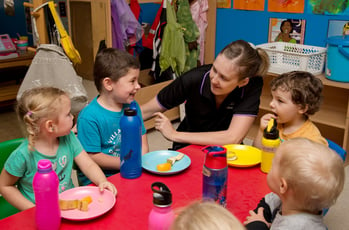Why you should consider a career in early childhood education
A common misconception about the early childhood industry is that it is just about Childcare....


Are you in your final year at high school, an employee looking for a career change or want to be more marketable in your existing profession? Selecting the right training program or qualification is a key component of any successful career decision, however it can be a complex decision and a very daunting task.
My first piece of advice is always start with the destination in mind. This gets easier as we get older, mainly because options become more limited. But imagine as a teenager asking yourself that question? The possibilities are endless. The destination, end game or career outcome you are hoping to achieve is the first point of call because knowing where you wish to end the journey makes the path selection a little easier. It does not guarantee you will end up there, as the thing we call life can interrupt your journey, however you need to start somewhere.
The second point that I think adds value to your decision making, is to understand that training is a means to an end. Training for the sake of learning something new with no destination or purpose, is not valuable in the context of your career. You should still enrich your life with learning all sorts of new things - music, sports, literature, arts etcetera; but in the context of a lifelong career, you need to be very pragmatic about the selection of your training course and who provides it. What and where you study is very important in determining where you will end up?
In no particular order, here is my two cents on the variety of training options you may want to consider:
It is obvious that for some careers, University is compulsory. These are generally what are commonly called 'professions'; medicine, engineering and the like. If you want to be Doctor of Medicine, then ultimately you must end up graduating from a University with a medical degree. However, University courses are much more than traditional professions and University is about more than just the particular degree you study. There are also many different University options from traditional sandstone institutions to online programs or a combination of both.
Pros:
Vocational training often gets a bad rap as the poor cousin of University. This however is unfair and vocational training covers much more territory in 2016 than the past perception of just manual trade schools. There are hundreds of TAFE and private college options with a wide range of programs from certificate courses, apprenticeships and Diploma level study, but be wary currently as there are a few unscrupulous colleges still operating. The government is working on cleaning up this area and it is the fastest growing post-secondary training sector.
Pros:
Cons:
For many this can be the ultimate career development pathway. To get the job first and then get trained and developed at work while being paid, almost sounds like the dream come true. And it can be if you can get your foot in the door at the right Employer. Many large organisations offer extensive Learning and Development (L&D) programs for all their employees, from customer service through to management training. Many will also subsidise or pay for your own studies outside of work.
Pros:

Business Owner/Director

A common misconception about the early childhood industry is that it is just about Childcare....

Affinity Education Group (AEG) owns and operates 150-plus Lifelong Learning childcare centres...
Leave a Comment